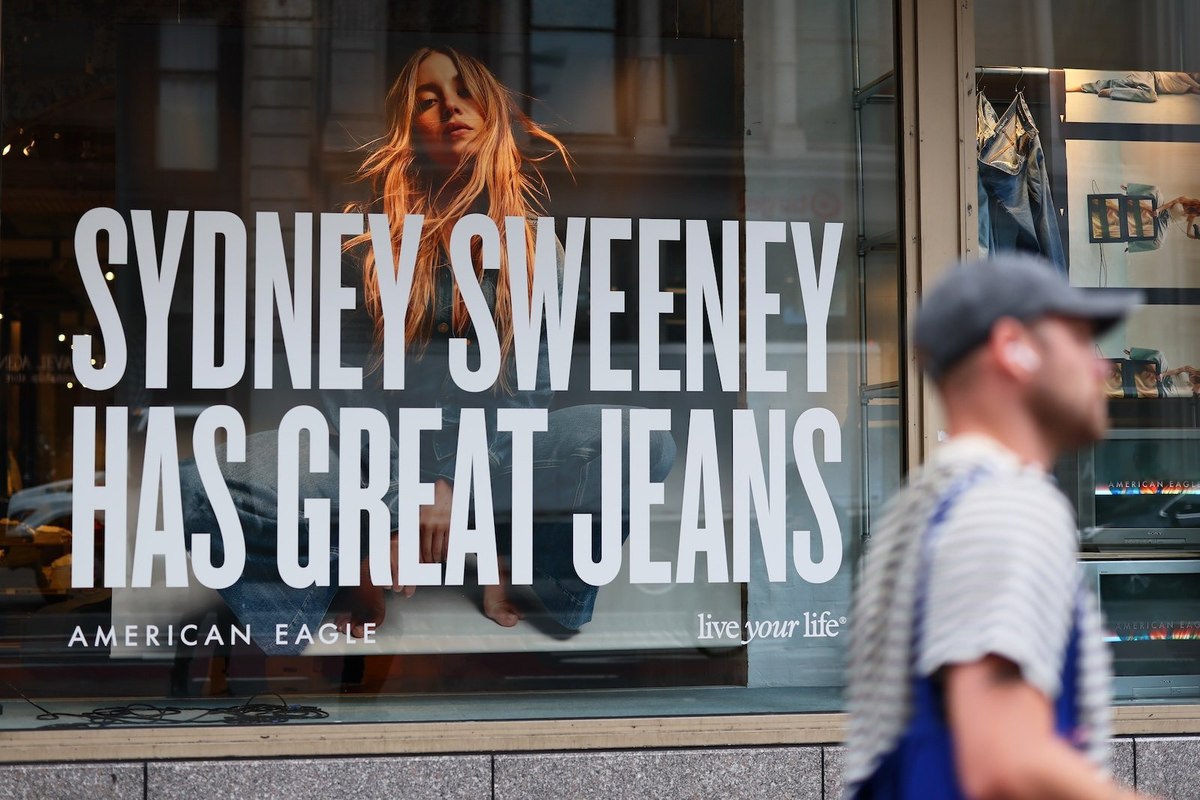Key findings
- In the latest survey, 59% of Americans say the ad is appropriate, up from 54% in early August.
- Democratic approval fell to 38% since August 1, while Republican approval climbed to 78%.
- Men (67%) remain more supportive than women (51%); older adults show higher approval than younger ones.
- Impression scores surged among Republicans after August 4, the day Donald Trump tweeted support for the ad, while Democratic sentiment declined sharply.
- Purchase Consideration has risen significantly among Republicans and the general public but remains flat to declining among Democrats.
American Eagle’s latest campaign featuring actress Sydney Sweeney sparked widespread public reaction with the tagline: “Sydney Sweeney Has Great Jeans”, which plays on a homophone with “genes.”
The campaign became a cultural flashpoint as soon as it was announced on July 23. Immediately, the brand’s stock price surged 10% and discourse began buzzing online, splitting along political lines. Some criticized the ad’s allegedly eugenic or objectifying message, whereas others seem critical of the criticism. Musicians Doja Cat and Lizzo have appeared to mock the ad, while President Donald Trump voiced public support, noting Sweeney’s status as a registered Republican.
YouGov data suggests that the ad campaign and subsequent discourse have had a polarizing effect on public opinion about American Eagle Outfitters. The most bipartisan fashion brand of 2024 may be no longer.
Are Sydney Sweeney’s “great jeans” inappropriate?
A YouGov survey conducted on July 31-August 1 found that 54% of Americans considered the ad appropriate, with 16% calling it inappropriate. After a week of headlines and memes, a more recent survey (August 7-11) showed that the share of respondents “not sure” about the ad fell from 29% to 24%. Mostly, these decided that the ad is appropriate, with approval climbing to 59% from 54%. Disapproval held steady at 17%.
By political party identification
Political affiliation is the most significant dividing line when it comes to opinions about this jeans advert. In the August 7–11 survey, Republican approval reached 78%, up from 68% earlier in the month, with disapproval holding at 9%. Democratic approval dropped from 48% to 38%, and disapproval rose from 23% to 29%. Thus, in a week, the approval gap between Republicans and Democrats moved from 20 percentage points to 40. Independents’ support also increased, from 52% to 64%.
While opinion is split along political lines, Americans are broadly approving of the ad. Those who say the ad is inappropriate is the smallest group among all demographics analyzed above, including Democrats, of whom 29% say the “jeans/genes” wordplay is inappropriate.
By gender, age and race
Men are more likely to find the ad appropriate than women (67% vs. 51%). Approval remains lowest among younger adults aged 18–29 (44%), compared to 70% among those 65 and older. However, 18-29-year-olds have become more likely to approve the ad in the period between the two surveys rather than less.
White Americans (63%) are more supportive than Black (42%) or Hispanic (54%) Americans.
How is the brand doing? Republicans feel better about American Eagle than Democrats
The campaign’s launch on July 23 coincided with heightened media attention and a stock price bump for American Eagle. BrandIndex tracking shows that Impression scores — measuring whether people feel positively or negatively toward a brand — moved differently for Republicans and Democrats.
Among Republicans, Impression rose from 30 on July 23 to 36 by August 4. On that date, Donald Trump tweeted that Sweeney had “the hottest ad out there,” prompting a sharp rise in Republican sentiment. By August 11, Republican Impression stood at 43, up 13 points since the campaign launch.
Democrats saw a different trajectory. Impression peaked at 25 on July 27 but began to decline after the controversy gained coverage. Following Trump’s August 4 tweet, Democratic scores fell further, dropping from 18 on August 4 to just 9 by August 11 — a 16-point decline from the peak.
Among the general public, Impression rose modestly from 22 to 25 over the same period, suggesting overall sentiment improved slightly despite the partisan divergence.
Consideration rises for Republicans
Consideration — the share of consumers who say they would consider buying from American Eagle when next in the market — also saw significant shifts. Among Republicans, Consideration climbed from 16% on July 23 to 19% by August 4, then surged to 25% by August 11. The gains were particularly strong after Trump’s public endorsement.
The general population showed a similar upward trend, with Consideration rising from 13% on July 23 to 17% by August 4, and then to 19% by August 11.
Democrats, however, remained largely flat. Their Consideration moved from 13% on July 23 to 15% on August 4, before slipping back to 14% by August 11. This suggests the campaign — and especially the high-profile political endorsement — may have had little positive effect, and potentially a dampening one, among Democratic consumers.
American Eagle’s “great jeans” campaign with Sydney Sweeney has shifted from a marketing play to a cultural flashpoint. While national approval of the ad has grown, support is now even more polarized by political affiliation, with Republicans embracing it more strongly and Democrats cooling on it.
At the same time, brand health data suggests the campaign has been effective at driving engagement. American Eagle has successfully captured a broad swath of attention, even if it isn’t universally positive.
Methodology: YouGov Surveys: Serviced provides quick survey results from nationally representative or targeted audiences in multiple markets. This study was conducted online on August 7-11, with a nationally representative sample of 1,128 adults in the United States (aged 18+ years), using a questionnaire designed by YouGov. Data figures have been weighted by age, gender, education and region to be representative of all adults.
YouGov BrandIndex collects data on thousands of brands every day. American Eagle’s scores are based on an average daily sample size of 1601 US adults between July 13, 2025 to August 11, 2025. Figures are based on a 2-week moving average.
